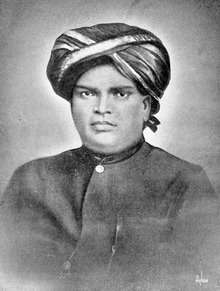Manonmaniam Sundaram Pillai
Manonmaniyam P. Sundaranar (4 April 1855 – 26 April 1897) was an Indian scholar, noted for the famous Tamil drama Manonmaniyam.[1] as well as the state song of Tamil Nadu Tamil Thai Valthu.
Manonmaniyam P. Sundaram Pillai | |
|---|---|
 | |
| Born | Manmoniyam Perumal Sundaram 4 April 1855 |
| Died | 26 April 1897 (aged 42) |
| Occupation | writer, scholar |
| Spouse(s) | Sivagami Ammal |
Early life
He was born in the area of Alleppey in Travancore, to Perumal Pillai and Madathi Ammal. Pillai studied religious literature such as Tevaram, Thiruvasagam during his childhood. Nagapattinam Narayana Samy Pillai was his Tamil language teacher. He completed his B.A. in 1876 and in the following year, he married Sivagami Ammal.
Career
His career as an educator began in 1877. He became the Principal at a bilingual English-Tamil school in Tirunelveli, playing a key role in the school's development. Pillai later taught philosophy at H. H. The Maharaja's University College, Trivandrum and he completed his M.A. in 1880. During that period he became acquainted with Robert Harvey.
Sundaram showed his respect for Harvey, a Scottish Professor of Philosophy and English at The Maharaja's College, by dedicating his drama Manonmaniyam to him, and naming his farmhouse after him.[2] Together they wrote the book, Some Early Sovereigns of Travancore.
The MDT Hindu College, Tirunelveli, of which he was the first Principal, describes his works as follows:[3]
He established Saiva Prakasha Sabha at Trivandram in 1885. He taught Swami Vivekananda about the Saiva Sidhantham. In 1885, he published Chathira Saugiragam, commonly known as Nootrogai Villakkam. He wrote and published his masterpiece Manonmaniam in 1891. In the same year, he became a member Fellow of Madras University (FMU). In 1897, Some Early Sovereigns of Travancore was published and he became a Member of Royal Asiatic Society (MRAS).
He published Some Milestones in the History of Tamil Literature in 1895.
Recognition
Pillai became a Member of Fellow of Royal Historical Society (FRHS). To honor his accomplishments South Indian historical research, the Madras Government gave him the title of Rao Bahadur in 1896.
He was awarded an honorary doctorate by a German university.
Death
He died of diabetes on 26 April 1897, at age 42. His son PS Nataraja Pillai served as Minister of Finance for Travancore-Cochin state from 1954-56 and was also a member of Constituent Assembly of India. He was elected to state legislative assembly of Kerala and to the Indian Parliament as a Lok Sabha member. He was politically associated with the Indian National Congress and Praja Socialist Party of India.[4]
Legacy
Manonmaniam Sundaranar University was named after him.
The 1942 cinema adaptation Manonmani, is considered a classic film.[1]
The song "Niraarum Kadal Udutha" from Manonmaniam was adapted as "Invocation to Goddess Tamil" and approved by the Government of Tamil Nadu as the official Tamil anthem in June 1970.
Works
- Nūṟṟokai viḷakkam (நூற்றொகை விளக்கம்) (Tamil,1888)
- Maṉōṉmaṇīyam (மனோன்மணீயம்) (Drama, 1891)
- Some early sovereigns of Travancore (திருவிதாங்கூர் பண்டை மன்னர் கால ஆராய்ச்சி. P.S. Natarajan. 1894.
- Some Milestones in the History of Tamil Literature: Found in an Enquiry Into the Age of Tiru Gnana Sambandha. Addison & Company. 1895.
- Tamiḻttāy vāḻttu (தமிழ்த்தாய் வாழ்த்து)
See also
References
- Randor Guy (19 December 2010). "Manonmani 1942". The Hindu. Archived from the original on 22 October 2012. Retrieved 11 April 2012.
- "University of Glasgow :: International Story :: Robert Harvey". Internationalstory.gla.ac.uk. 16 June 2011. Archived from the original on 4 July 2013. Retrieved 22 July 2015.
- "Madurai Diraviyam Thayumanavar Hindu College, Tirunelveli". Mdthinducollegetirunelveli.org. Archived from the original on 10 May 2013. Retrieved 22 July 2015.
- "Archived copy". Archived from the original on 4 August 2019. Retrieved 4 August 2019.CS1 maint: archived copy as title (link)
External links
- Dr. Kanam Sankara Pillai, Prof. Manonmaneeyam Sundaram Pillai MA (1855-1897)
- Manonmaniyam (Project Madurai)